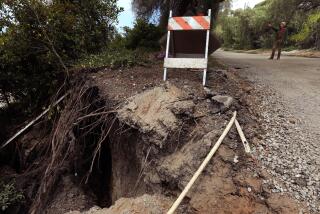Forfeiture Laws Give U.S. a Piece of a Casino : Narcotics: Government now owns about 30% of Bicycle Club in Bell Gardens, which was built to a large extent with smuggled drug money.
The federal government has become part owner of the most valuable asset ever seized under racketeering forfeiture laws--a Bell Gardens card casino that takes in $275,000 a day.
After a federal court ruling and a series of out-of-court settlements, the government now owns about 30% of the Bicycle Club--a card casino whose biggest owners once earned more than $100,000 a month from the club’s profits.
Federal authorities seized the Bicycle Club in April, 1990, after a jury found that $12 million of the $22 million used in its construction came from Florida drug smugglers. The club’s profits were frozen and placed in a special U.S. marshal’s account until the court could hold a civil hearing to determine which partners knew that the club was built with drug money.
Last month, a Florida federal judge ruled that at least one of the card casino’s partners, former Westside banker M. Dale Lyon, knew about the club’s financing. Eight other partners agreed to forfeit portions of their interest in the club before the civil hearing began.
Federal Judge Norman C. Roettger ordered Lyon, who owned 9% of the Bicycle Club, to forfeit one-third of his interest to the government. Roettger said Lyon was involved in the money-laundering scheme from the outset.
“Lyon not only knew of the scheme or idea that the club would be built with money laundered from drug proceeds . . . but helped develop and carry out the plan,” Roettger wrote in a 93-page ruling that laid out the details of the money-laundering operation.
In addition, federal prosecutors say they plan to seek an indictment of Lyon for his alleged role in the scheme. Lyon’s attorney, Richard Marmaro, who has appealed the judge’s ruling, said his client has done nothing wrong.
The club, seized under provisions of the Racketeer Influenced and Corrupt Organizations Act, is the single most valuable asset ever confiscated by the U.S. government, according to the U.S. attorney’s office of the Southern District of Florida. According to estimates by lawyers involved in the case, the U.S. government has already received several million dollars in the forfeiture action and will reap about $500,000 a month for as long as it owns an interest in the club. However, Diane Cossin, a spokeswoman for the U.S. attorney’s office, said the government eventually will auction its share.
The seizure of the club last year came after a four-month criminal trial in which federal prosecutors claimed the money-laundering scheme was masterminded by convicted drug smuggler Ben Kramer and by Los Angeles developer and UCLA booster Sam Gilbert.
Gilbert died before he could stand trial. He was never a partner in the Bicycle Club but he set up LCP, the corporation that owned a majority interest in the club and provided the funding for construction.
Gilbert’s son, Michael, an LCP partner, was convicted after testimony during the criminal trial revealed that he had delivered cash from his father to coin dealers and bankers to be converted into gold coins and cashier’s checks. That money was laundered through two overseas accounts and eventually funneled back to LCP accounts, prosecutors said.
Michael Gilbert was sentenced to four years in prison and forced to hand over his 6.6% interest in the club to the government.
However, the civil hearing that followed never fully revealed which partners knew the club was built with drug money.
George Hardie, the general manager of the club and his California investment group, Park Place Associates, which owns 35% of the Bicycle Club, were exonerated.
LCP partners Julianne Coyne and former California Assemblyman David C. Pierson settled before the civil hearing. They agreed to give up about half of their interest in LCP.
Other owners who agreed to forfeit part of their interests included Coyne’s and Pierson’s spouses; Lyon’s wife; Michael Gilbert’s siblings, Robert and Margaret Gilbert, and the Robert Gilbert Family Trust.
Roettger said in his ruling that Robert and Margaret Gilbert apparently were not involved in the scheme, but he did not address whether the other partners who settled knew about it.
More to Read
Sign up for Essential California
The most important California stories and recommendations in your inbox every morning.
You may occasionally receive promotional content from the Los Angeles Times.





